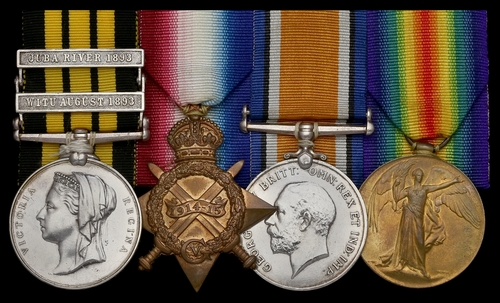
Auction: 25002 - Orders, Decorations and Medals
Lot: 32
A rare ‘Juba River 1893’ group of four awarded to Able Seaman C. Clift, Royal Navy
East & West Africa 1887-1900, 2 clasps, Witu August 1893, Juba River 1893 (C. Clift, A.B., H.M.S. Blanche.); 1914-15 Star (129434, C. Clift. A.B. R.N.); British War and Victory Medals (129434 C. Clift. A.B. R.N.), very fine (4)
42 clasps for ‘Juba River 1893’ issued to the Royal Navy, 24 in combination with the clasp ‘Witu August 1893’.
Charles Clift was born on 8 December 1869 in the village of Freshford in Somerset. He joined the Royal Navy on 9 December 1884, aged 15 years, as a Boy 2nd Class aboard the Training Ship H.M.S. Impregnable. Advanced Ordinary Seaman on 8 December 1887, he began his adult service and joined Blanche from December 1890. Whilst in the latter vessel he was advanced to Able Seaman on 1 May 1891. During the three and a half years he spent in the 3rd Class Cruiser Blanche, Commander G. R. Lindley R.N., much of which was in East African waters, Clift was twice landed for service on shore with the ship's Naval Brigade.
On the first occasion he was a member of a Naval Brigade consisting of 10 officers, 220 seamen and 36 Royal Marines drawn from H.M. Ships Blanche, Sparrow and Swallow. The Naval Brigade landed at Lamu on 7 August 1893, to punish Furno Omari, Sultan of Witu, who was openly rebellious and defiant and had committed a number of atrocities. The stronghold villages of Pumwani and Tongeri were attacked; the gates of Pumwani were blown up by a field gun and war rockets and both towns were taken after a short, sharp fight. The Naval Brigade lost one stoker killed, and two officers and six seamen wounded. Following their successful action, the members of the Naval Brigade returned to their respective ships on 15 August 1893. Each member was later to receive the East and West Africa Medal with Clasp 'Witu August 1893 '.
A week after returning on board Blanche, Clift again volunteered to land as part of a much smaller Naval Brigade under Lieutenant P. V. Lewes, R.N. On hearing the news that Mr W. G. Hamilton, Superintendent of Askaris, had been murdered at Turki Hill, and that Count Lovattelli and Mr Farrant of the Imperial British East Africa Company were under siege at the British Residency at Kismayu, Commander G. R. Lindley of H.M.S. Blanche took the decision to land a small Naval Brigade to rescue them. The all-volunteer party of 42 sailors and stokers were joined by an additional 50 loyal Keribotos when they landed at the mouth of the Juba. Following a tiring night march, the force arrived at Turki Hill on 24 August, which was taken after a brisk fight. The small defending force at the Residency was relieved; upon hearing that Captain Tritton and Mr McDougall were trapped aboard the British Imperial East Africa Company's steamer Kenia at nearby Gobwen on the Juba River, Lieutenant Lewes and his small force set out to rescue them.
On finding the two Englishmen safe, Lieutenant Lewes decided to fortify the steamer by placing iron plates, cut-up canoes, sand bags and bales of goods around the sides. Two maxim guns were mounted, and the Hotchkiss gun in the bow was manned. On 25 August the steamer set off up river to punish the mutineers and to destroy the town of Kajwalla. After proceeding only a short distance, the engine donkey feed pump broke down and the boiler fires had to be drawn. The element of surprise had been lost and the Kenia came under heavy fire from the mutineers concealed on the banks of the Juba River. The repairs to the pump, which took four hours to complete, were carried out by the engine room ratings. The steamer then continued upriver to shell and destroy the village of Magarada. After further shelling and firing of rockets, 30 men were landed from the Kenia, and after one hour of fighting, the town of Kajwalla was taken, burned and destroyed.
The Kenia then crossed to the other side of the river, landed every available man, and after a brisk fight the town of Majawen was captured and destroyed. The Naval Brigade then returned to the Kenia and soon after rejoined the Blanche. For his services, Lieutenant P. V. Lewes received the Distinguished Service Order. The members of the Naval Brigade received the East & West Africa Medal with clasp 'Juba River 1893'. Those who were present at the previous action at Witu earlier in the month received the clasp only.
Clift was pensioned ashore having completed twenty years’ adult service in 1907. He was never awarded an L.S. & G.C. Medal, since on three separate occasions his character assessment fell below 'Very Good'. Shortly after his discharge, he joined the Royal Fleet Reserve at Devonport on 5 January 1908, and was mobilised on 2 August 1914 on Caesar, serving with the 7th Battle Squadron in the English Channel. He remained aboard when the ship was transferred to the Mediterranean Fleet early in 1915. Following a short period aboard Vivid, Clift was transferred in February 1918 to Hecla II, Base Ship at Buncrana, and remained in this posting until he was demobilised in November 1919, having served his country for a total of 25 years.
Subject to 20% VAT on Buyer’s Premium. For more information please view Terms and Conditions for Buyers.
Sold for
£3,500
Starting price
£2800




